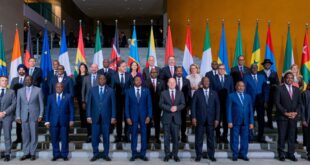One key element of the partnership of the world’s leading twenty economies with African states conceived by Germany, which currently holds the G20 presidency, is the Compact with Africa (CWA). Its aim is to promote private investment and investment in infrastructure in the participating countries. Drafts for agreements with five African countries – Côte d’Ivoire, Morocco, Rwanda, Senegal and Tunisia – under the initiative were presented at the G20 Africa Partnership Conference on 12-13 June in Berlin.
The partnership will be on the agenda at the 12th G20 Summit of Heads of States and Governments in Hamburg on 7-8 July. Prof. Jann Lay, acting director of the Hamburg-based GIGA Institute for African Studies, explains why the G20 Africa initiative is an incomplete approach and how best to redesign it for better results.
- The CWA initiative cannot and should not be seen as a way to quickly eliminate the root causes of flight and migration. It can support development processes in Africa, but in itself is not sufficient. The initiative is rightly focussed on investments, but one must not ignore the fact that the causes of economic (sub) development go beyond the areas of investment and infrastructure.
- The CWA disregards four main problem areas: First, investment in education is not included. Secondly, the extent to which the G20 countries are responsible for the unreliable framework conditions for trade and investment in Africa which have an inhibitive effect on investment are not discussed. Third, the social and environmental risks of private investment are not identified. Fourth, the CWA initiative is not based on a comprehensive sustainability agenda, as set out in Agenda 2030.
- From a technical point of view, the initiative is more than convincing; it proposes instruments that can provide passport capital for investments in Africa and enable better preparation of investment projects. Risk-reducing subsidies play an important role here. However, other instruments may be better suited to promote private investment in small, highly profitable and high-risk projects in Africa.
- Conclusion
Support for Africa through the CWA Initiative can only be successful if it is long-term and comprehensive. To this end, it should be linked to country-specific development strategies based on Agenda 2030. Investment in education should be an integral part of the agreements. In addition, the G20 countries should commit themselves to computable trade arrangements for Africa. Investors, multilateral development banks and recipient countries must counteract potentially harmful environmental and socio-economic impacts of private investment by respecting international standards and implementing safeguards effectively.
Apl. Prof. Dr. Jann Lay is acting director of the Institute for African Studies at the German Institute of Global and Area Studies (GIGA) and Head of the institution’s Research Centre 3 “Growth and Development”. He is also an visiting professor of development economics at the Georg-August-University Göttingen, Germany
 THE AFRICAN COURIER. Reporting Africa and its Diaspora! The African Courier is an international magazine published in Germany to report on Africa and the Diaspora African experience. The first issue of the bimonthly magazine appeared on the newsstands on 15 February 1998. The African Courier is a communication forum for European-African political, economic and cultural exchanges, and a voice for Africa in Europe.
THE AFRICAN COURIER. Reporting Africa and its Diaspora! The African Courier is an international magazine published in Germany to report on Africa and the Diaspora African experience. The first issue of the bimonthly magazine appeared on the newsstands on 15 February 1998. The African Courier is a communication forum for European-African political, economic and cultural exchanges, and a voice for Africa in Europe.

































